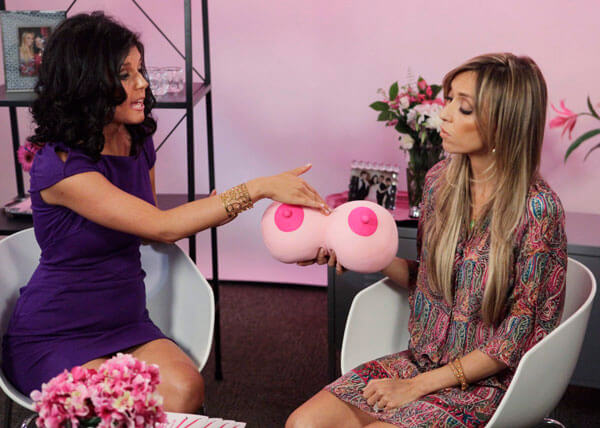Dr. Magdalena Lombardi Plasilova is a surgeon and director of breast health services at Brookdale University Hospital and Medical Center specializing in the comprehensive care of breast cancer patients. In honor of Breast Cancer Awareness month, Dr. Plasilova and Brookdale University Hospital bring their expertise on the diagnosis and management of breast cancer with their advice on prevention and self-exams.
Says Dr. Plasilova, “Being a woman is the single greatest risk for breast cancer, so we must do everything we can to prevent becoming a statistic.
“We need to educate ourselves, our daughters, our sisters and our neighbors. It is essential for women to self-check, schedule regular screenings, and live a healthy lifestyle!”
How to conduct a Breast Self-Exam
Optimally, a breast self-exam should be done once a month, approximately 7-10 days from the beginning of the menstrual cycle, or around the same time each month if periods are no longer existent.
1. Begin by removing your clothing and standing in front of a mirror. You will want to check your breasts for changes in the size, shape or color. You will want to check for any changes to the skin and nipples as well, including: any sores, dimples or redness. Check all angles of your breasts by lifting and looking underneath as well as from the side. Put your hands above your head and repeat the same process of checking all angles.
2. Lie down on the ground and feel your left breast with your right hand and your right breast with your left hand using a firm touch and a circular motion. Your fingers should remain flat, not pointed, and together. Repeat the same process while standing.
3. Check your nipples by pulling them forward and checking for discharge or fluid.
4. If you find anything unusual, give your doctor a call or schedule an appointment.
Talk to your Doctor
1. Get regular breast cancer screenings: Early detection is essential. Getting in the habit when you are young will develop good habits as you age into the prime diagnosis years
2. Ask your doctor to decide what type of screening you need and how often: Every woman is different. Learn your family history and work with your doctor to determine what is right for your body, age and breasts.
Live Your Best Life
Early detection is ideal, but living a healthy lifestyle is the surest way to prevent breast cancer and other health complications.
1. Limit alcohol to no more than one drink per day
2. Eat Healthy
3. Exercise regularly
About Brookdale University Hospital and Medical Center
The Brookdale University Hospital and Medical Center is a 530-bed not-for-profit teaching hospital. Brookdale provides general and specialized inpatient care to thousands of people every year. In addition, Brookdale provides 24-hour emergency services, numerous outpatient programs and long-term specialty care.
Brookdale is one of Brooklyn’s largest, and most experienced full service emergency departments and a regionally recognized Level I Trauma Center. Brookdale is also a New York State DOH designated Stroke Center. The hospital houses a state-of-the-art Cardiac Catheterization Laboratory with the most high-tech imaging equipment available in Brooklyn. Its community centered organization also provides numerous outpatient Ambulatory Care services in both on campus and off site facilities. Additionally, specializes in rehabilitative medicine and long-term specialty care in the renowned Schulman and Schachne Institute for Nursing and Rehabilitation and in addition is home to 86 units of assisted living and independent housing in the Arlene and David Schlang Pavilion.
















